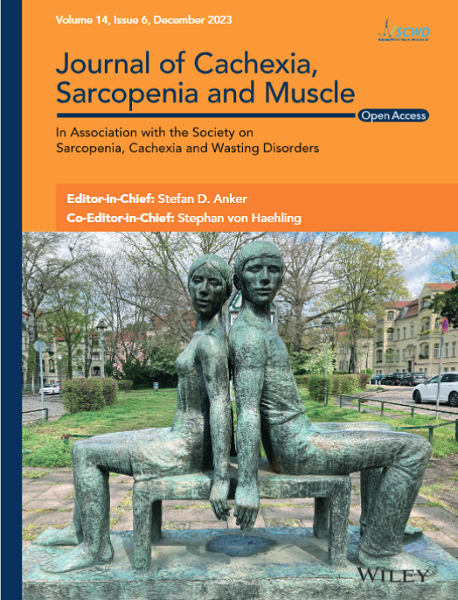Sarcopenia affects the quality of life and increases adverse outcomes in the elderly. However, as a potential safe and effective remedy to many age-related disorders, little is known about the protective effect of melatonin against sarcopenia, especially the underlying mechanisms of pathophysiology related to the gut–muscle axis.
The young (4 months) and old-aged (24 months) wild-type C57BL/6J male mice were included in this study, of which the old-aged mice in the experimental group were treated with 10 mg/kg/day of melatonin for 16 weeks. After that, muscle strength, muscle mass and the cross-sectional area (CSA) of the gastrocnemius muscle fibres were measured. Then, the putative pathways, based on the data obtained from 16S rDNA sequencing of the gut microbiota, RNA sequencing of gastrocnemius muscle and serum untargeted metabolomics, were screened out by the integrated multiomics analysis and validated using immunohistochemistry, ELISA and TUNEL staining. C2C12 myoblasts were treated with LPS. Flow cytometric analysis and western blotting were applied to detect cell apoptosis and protein expressions of Tnfrsf12a and caspase8, respectively. In addition, the mediation analysis was carried out to infer the causal role of the microbiome in contributing to the skeletal muscle through metabolites.
Melatonin treatment ameliorated age-related declines in muscle strength (p < 0.05), muscle mass (p < 0.01) and CSA of the gastrocnemius muscle fibres (p < 0.01), as well as changed the gut microbial composition (beta-diversity analysis; R = 0.513, p = 0.005). The integrated multiomics analysis implied two main mechanisms about the impact of melatonin-related modifications in the gut microbiota on sarcopenia. First, a lower serum lipopolysaccharide (LPS) level associated with the altered gut microbiota was observed in melatonin-treated mice (p < 0.001) and was most relevant to the transcription level of Tnfrsf12a in skeletal muscle (R = 0.926, p < 0.001). Further bioinformatics analyses and in vitro experiments showed that LPS could contribute to skeletal muscle apoptosis by regulating the Tnfrsf12a/caspase-8 signalling pathway. Second, melatonin significantly altered serum metabolites (variable importance on projection (VIP) > 1.5, p < 0.05). Mediation models showed that changes in the gut microbiome also influenced skeletal muscle through these metabolites (27 linkages; BH-adjusted p < 0.05).
Our study revealed functional insights and a putative causality for the role of the gut–muscle axis in the mechanism of melatonin ameliorating age-related sarcopenia, namely, inhibition of the LPS-induced Tnfrsf12a/caspase-8 signalling pathway or serum metabolites as intermediates in the gut–muscle axis.


